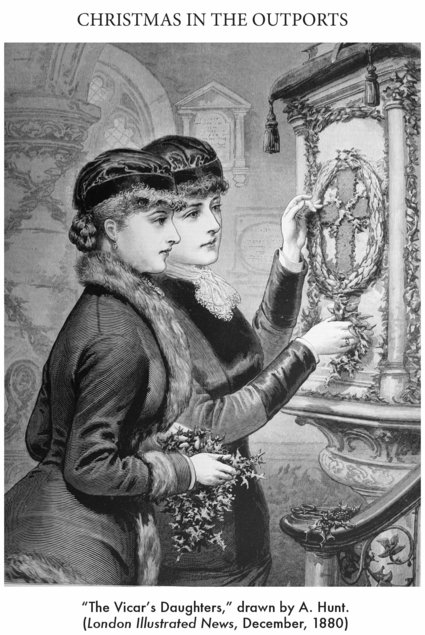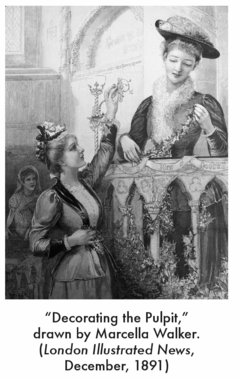Classic Christmas Stories
Read Classic Christmas Stories Online
Authors: Frank Galgay



Library and Archives Canada Cataloguing in Publication
Classic Christmas stories [electronic resource] / [edited by] Frank
Galgay.
Includes bibliographical references and index.
Electronic monograph.
Issued also in print format.
ISBN 978-1-77117-070-3 (EPUB).--ISBN 978-1-77117-071-0 (Kindle).--
ISBN 978-1-77117-072-7 (PDF)
1. Christmas--Newfoundland and Labrador. 2. Newfoundland
and Labrador--Social life and customs. I. Galgay, Frank, 1940-
GT4987.15. C63 2012 394.2663’09718 C2012-905783-5
© 2012 by Frank Galgay
ALL RIGHTS RESERVED
. No part of the work covered by the
copyright hereon may be reproduced or used in any form or by any means—graphic,
electronic or mechanical—without the written permission of the publisher. Any
request for photocopying, recording, taping, or information storage and
retrieval systems of any part of this book shall be directed to Access
Copyright, The Canadian Copyright Licensing Agency, 1 Yonge Street, Suite 800,
Toronto, ON M5E 1E5. This applies to classroom use as well.
Cover Design: Adam Freake
Cover Illustration: Matt Tames
F
LANKER
P
RESS
L
TD
.
PO B
OX
2522, S
TATION
C
S
T
. J
OHN
’
S
, NL
C
ANADA
TELEPHONE: (709) 739-4477 FAX: (709) 739-4420 TOLL-FREE: 1-866-739-4420
WWW. FLANKERPRESS. COM

We acknowledge the financial support of the Government of Canada through the
Book Publishing Industry Development Program (BPIDP) for our publishing
activities; the Canada Council for the Arts which last year invested
$24.3 million in writing and publishing throughout Canada; the Government of
Newfoundland and Labrador, Department of Tourism, Culture and Recreation.
I dedicate this anthology to my family,
especially my wife, Rosemary, our four
children, their spouses, and my four grandchildren,
who cherish and enjoy the true meaning
and spirit of the Christmas season.
I heard the bells on Christmas Day
Their old familiar carols play.
And wild and sweet words repeat
Of peace on Earth, good will to men!
— Henry Wadsworth Longfellow
IT HAS BEEN A labour of love over these past few years to compile a series of
stories by some very prominent citizens and writers relating to Christmas in
Newfoundland and Labrador. These stories cover the period from the 1800s to the
present and reflect the emotions of joy, happiness, humour, tragedy, caring,
sharing, peace, and goodwill. I have made a special effort to research and
attach a brief biographical sketch of each living and deceased writer. The
information, if it was available, was obtained from individual writers,
relatives, the library, and archival sources.
Our Christmas customs and celebrations in Newfoundland and Labrador reflect a
rich and diverse range of traditions that our ancestors brought over from the
mother countries of England, Ireland, Scotland, and France. They have been
further enriched by the presence of persons
from other
countries where the season plays a significant role in their lives.
I hope that these Christmas stories relating to Newfoundland and Labrador will
enhance our knowledge and appreciation of the past. They will, hopefully, help
us celebrate all that is associated with the unchangeable message of the
Christmas season.
All of the stories contained herein have been written by some of Newfoundland
and Labrador’s—indeed, by some of Canada’s—finest writers and have been
published in magazines and other media over the past 160 years. In the spirit of
preserving their originality, I have opted to present them, without substantive
editing, as they appeared in their respective publications.
FRANK GALGAY

A Newfoundland Christmas Tale
by Rev. Moses Harvey
T
HE OLD SCHOOLMASTER OF Punch Bowl had at length passed
over to the great majority, and irrevocably joined the mighty nations of the
dead. For more than a quarter of a century had he urged successive generations
of young Punch Bowlers along the flowery paths of knowledge. Believing
thoroughly in the entire depravity of human nature, he held that there was but
one way of getting knowledge into the heads of the young—a sharp application of
the rod at the opposite extremity. The newfangled ways of smoothing the path of
learning, and making knowledge pleasant and attractive, he despised as weak and
contemptible. The very moderate success which attended his educational labors,
he accounted for by the theory which he firmly held—that the children born in
Punch Bowl were all utterly and irreclaimably stupid— “the very scruff of
Newfoundland.” Grim and rough as he was, there were “streaks” of kindness in his
heart if you could only strike on them. His temper, however, was sorely tried
with the wild boys of the village; and if the instruction imparted by the poor
old man was moderate in amount, his salary was proportionately small. Perhaps
after all, amid his rude environments, and sore discouragements, it might be
said of him, “he did what he could”; and helped a little pioneer the
way for better things. One wintry afternoon, an hour before
the usual time of dismissal, he gladdened the hearts of his scholars by saying,
in gentler tones than usual, “Children, its growing dark—get home before the
storm comes.” Next day he was reported to be sick; and before a week had passed
his coffin was borne to the little church-yard. Then people discovered his good
points; and many a kindly word was spoken of the old man when he was quite
insensible to human praise and blame.
“It won’t do, ” said Parson Hurlbut to his wife, “to have the school closed. We
must send to St. John’s for a trained teacher who will be abreast of the age,
and help to raise these people out of the ruts of ignorance.” “Let him be a
young man, and unmarried, ” said Mrs. Hurlbut— “these old men with wives and
children will not be advised, and make no improvements.” In response to the
Parson’s application, a young schoolmaster was despatched to Punch Bowl. He was
rather a well-favored youth, and dressed smartly. His accent and polished
manners showed that he lived in the metropolis of the colony. He never taught in
his shirt-sleeves, like his predecessor; never was seen to smoke a pipe as he
heard the lessons, and, to the astonishment of the Punch Bowlers, he discarded
the rod, and announced his intention of trusting entirely to “moral suasion”—a
mysterious phrase which the good people did not pretend to understand, and
therefore reverenced the more as “a new discovery in larnin’.” The Parson’s wife
was charmed with the young schoolmaster, and never tired sounding his praises.
When he met her, he raised his hat gracefully, and always addressed her as
“Madam.” She was a woman “of a certain age, but very uncertain temper, ”—sharp
in features and by no means prepossessing in appearance. The good people of the
village respected her as their Parson’s wife, but I am afraid did not love her.
There was a hardness about her manner, and a want of sympathy with the feelings,
wants and woes of the little community in which she lived. Perhaps if she had
been a mother, the natural asperity of her temper would have been softened, and
her better and kindlier nature fostered into activity by the clinging caresses
of the little ones; but the patter of little feet was not heard in her
dwelling—the Parson and she were childless. In the young schoolmaster she took
an uncommon interest, and declared that the school since he came, was quite
another thing, and so it was. Hands and faces were cleaner among the children;
and to the astonishment of
parents, the boys and girls liked
to go to school, and could hardly be kept at home. The Parson declared the young
schoolmaster was a treasure. His surname was not an uncommon one—it was Smith;
but either because his parents were religious people or in order that he might
not be lost among the immense and indiscriminate mass of Smiths, they named him
Melchisedek. After he had been a year at the St. John’s academy, young
Melchisedek resolved to aid the effect by changing his homely patronymic into
Smythe.
For a time all went on smoothly with Melchisedek in his new sphere of labor.
His fame for learning spread far and wide. As in the case of Goldsmith’s
schoolmaster, the main source of astonishment was “how one small head could
carry all he knew.” It was even whispered that he could “tackle”” the Parson in
argument. On Sundays, his fine voice was greatly admired as he led the choir and
uttered the responses. He taught the children to sing, to the great delight of
the mothers. He organized a Lodge of Good Templars, and speedily had the gawky
young fishermen adepts in the evolutions and ceremonial of the Order, and
rejoicing in a whole alphabet of letters prefixed to their names. He had but one
difficulty to contend with—he was remarkably short-sighted; and of this defect
his scholars did not fail to take advantage.
Still young Melchisedek could not help feeling that life was rather dull in the
stupid little village of Punch Bowl, after the glow and excitement of St.
John’s. When his scholars had taken their departure, and the hum of the little
human hive had been followed by dead silence, he might be seen, at times gazing
out of the window, with a wearied and doleful expression of countenance. On one
of these occasions, he became aware—short-sighted as he was, that from a window
opposite, a pair of dark eyes were fixed upon him with interest. There was
something, he thought altogether uncommon in the bayonet-flash that came from
those dark orbs, and made a flame leap from heart to eyes in quick response. He
was conscious of a new sensation. Somehow he found himself afterwards, even
during school hours, watching that window; and if the black eyes shone there for
a moment, as often they did, there came such a glow over the master’s face as
made sunshine in the school, and mightily helped the scholars in getting through
the lessons. It was evident that young Melchisedek had met his fate; and the
fatal glance had come from the Parson’s kitchen
window. There,
among Mrs. Hurlbut’s pots and pans, presided Mary Manuel, the eldest daughter of
a small “planter, ” having taken service with the Parson, in order to somewhat
lighten her father’s expenses, who had what he called “a heavy family” of eleven
children. Mary was the acknowledged belle of the village—plump as a seal,
rosy-cheeked, with a most bewitching smile, suggestive lips, and above all, a
pair of glorious black eyes which seemed to challenge admiration. It was no
wonder those bright orbs set the schoolmaster’s heart in a glow, for they had
once drawn from an Irishman the compliment, “be dad, Mary, if ye would only look
into my pipe, yer eyes would light it.”

How acquaintance soon ripened into tender intimacy between Mary and the
Schoolmaster, may be safely left to the imagination of each reader of this true
tale. Very soon the boys in school as they irreverently and unfeelingly termed
it, “twigged” how matters stood; and commenced carving the name “Mary” on the
desks with their penknives. A precocious little girl of eleven was the first to
make the discovery, by following the direction which the master’s eyes took so
frequently, as he gazed out of the window. “The course of true love never did
run smooth.” One thing which the Parson’s wife refused to tolerate with her
servants was “followers.” These were sternly prohibited under all circumstances,
with the threat of instant dismissal, in case of a violation of the rule. Mary
felt it to be a hard law, when one evening her lover came to the kitchen door
after tea, and lingered longingly about the entrance. Almost before
she was aware she had invited him “to step in, ” and nearly
every evening after that Melchisedek paid a visit to the Parson’s kitchen. Very
sweet, it may be supposed, were those prohibited interviews; and to the lonely
schoolmaster, life began to wear a different aspect, and the world seemed a
kindlier, warmer place since Mary smiled on him. It was in the first weeks of
opening summer, when “a young man’s fancy lightly turns to thoughts of love, ”
that their acquaintance began, and it continued with increasing warmth till now
the Christmas holidays had arrived.
Mrs. Hurlbut had no suspicion how matters stood, and never dreamed that her
kitchen was haunted by a “follower.” Christmas Eve arrived. The Parson and his
wife had accepted an invitation to take tea on that evening with Mrs. Solomon
Dawe, the wife of the wealthiest “planter” in Punch Bowl. Having made all due
preparation for Christmas day by “stuffing” a splendid turkey, a present from
Mrs. Dawe, and constructing a magnificent plum-pudding, such as she knew the
soul of her Theophilus loved, Mrs. Hurlbut took her husband’s arm, and set out
to spend the evening with a clear conscience. The Parson’s heart too was at
ease. He had finished one of his very best Christmas sermons that afternoon,
with which he expected to make a great impression on the large congregation sure
to be present on Christmas Day. Little did either anticipate the catastrophe
which was at hand.
Melchisedek noted the departure of the Parson and his wife, and soon after, he
was seated in close proximity to Mary, at the parsonage fireside. After tea, the
conversation between the Parson and Solomon Dawe chanced to turn on the
Washington Treaty, one provision in which is, “that all fish-oils” are to be
admitted free of duty into the ports of the United States. The Parson argued
that the wording of this section would exclude the seal oil of Newfoundland, as
seals are not fish. “Not fish, ” exclaimed Solomon, in astonishment— “creatures
as swims in the sea and lives there constant, not fish!—what be they then—are
they four footed beasties? Parson, this book-larnin’ puts your head astray
sometimes— seals not fish! Don’t we call it the seal fishery?” “Very true, ”
said the Parson, “but it’s a misnomer—seals are no more fish than sheep. Did you
ever hear of a fish having warm blooded, marine quadruped, and belongs to the
family called naturalists, Phocadae.” But Soloman would not yield; and the
dispute ran so high that at last the Parson said he would
step
over to the parsonage, and bring from his library
Buffon’s Natural
History
, which would decide the question. To save time, he entered by
the back door, and surprised the lovers sitting by the fireside in suspicious
proximity. Mary looked guilty, and Melchisedek sheepish. The Parson smiled
good-naturedly, took his “Buffon” under his arm and returned to the party.
On his way home, he was indiscreet enough to tell Mrs. Hurlbut what he had
witnessed. Instantly her wrath flamed up, and she vowed that Mary, after such
shameful conduct, should never sleep under her roof. In vain did the Parson
remonstrate and remind her that tomorrow would be Christmas Day, and that if she
dismissed Mary, she would have to light the fires and cook the dinner herself,
as they had but one servant. She protested that whatever the sacrifice, she
should “march that instant.” So poor Mary, after having vials of wrath
discharged on her head, was turned out of doors and in tears sought the shelter
of her father’s cottage, where she received abundant comfort and encouragement
from her mother. It was just as well that Mrs. Hurlbut did not overhear the
opinion of her conduct expressed confidentially between those two women. It
would not have sweetened her temper.
Christmas morning dawned gently upon a slumbering world, whispering of “peace
and good will.” The Parson’s wife opened her eyes, and remembered, with a slight
twinge of remorse, her treatment of Mary, which was, perhaps, quickened by the
thought that she must thus early turn out of her warm bed and kindle the kitchen
fire. Melchisedek had passed a sleepless night in fear of what might have
happened to his Mary; and the moment he saw the parsonage chimney smoking, he
resolved to pay her an early visit, and learn the worst from her own lips, not
being aware of her dismissal the night before. In the grey dawn he stole quietly
along, and seeing the parsonage kitchen door ajar, he crept in on tip-toe. At
that moment the Parson’s wife was on her knees before the kitchen fire, vainly
trying to kindle the damp wood, her temper being no means improved in the
struggle. Melchisedek thought he would give his Mary a joyful surprise never
dreaming in the imperfect light, and with his short sight, but this was she.
Softly he crept behind the Parson’s wife, threw his arms about her neck, drew
back her head, and before the astounded woman could utter a cry or make a
struggle he kissed passionately,
right and left, north and
south. “Hip, hip, hurrah—hurrah”—exclaimed Melchisedek, by way of grace along
with meat accompanying every word with a more resounding kiss— “and a tiger, ”
he added, as he finished up with a smack, which was heard upstairs by the
Parson. “You impertinent scoundrel, ” exclaimed the outraged woman at length
getting her breath, “what do you mean by such conduct—get out of the house.” In
a moment the truth flashed on the young man, and muttering under his breath, “I
declare if it isn’t the old cat I’ve been kissing”—he fled from the house.